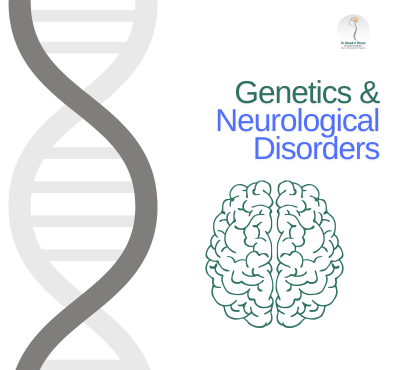1. Understanding Genes & the Nervous System
Genes serve as instructions guiding the development and function of the brain and nerves. When gene changes (mutations) occur, they can disrupt these processes, contributing to inherited neurological conditions. Disorders range from single-gene cases like Huntington’s and muscular atrophies, to multifactorial conditions like Parkinson’s where genes interact with environment.
2. Why It Matters in India
Neurological disorders burden India’s public health: incidence of strokes, dementia, epilepsy, and movement disorders have doubled in recent years, especially in older age groups. High birth rates and intra-community marriages increase prevalence of genetic conditions such as ataxia and leukodystrophies.
3. Key Inherited Neurological Conditions
3.1 Epilepsy
Nearly 30–40% of epilepsy is genetic. Over 200 genes (e.g., SCN1A, KCNQ2) can cause early seizures or later-onset forms. Having a parent with epilepsy doubles your risk.
3.2 Parkinson’s Disease
Genetics play a role in 10–15% of Parkinson’s cases. Genes like LRRK2, PARKIN, PINK1, and SNCA are implicated. Some familial mutations (like PARK2) are seen in ~25% of autosomal recessive early-onset cases in Indian families.
India could host 2.8 million Parkinson’s cases by 2050—a 168% increase—highlighting the need for awareness and early tracking.
3.3 Huntington’s Disease
An autosomal dominant disorder caused by HTT gene expansions (CAG repeats). Each affected person has a 50% chance of passing it on. Symptoms—movement disorders and memory loss—appear in adulthood.
3.4 Spinocerebellar Ataxia (SCA)
A group of disorders causing movement and coordination issues. Some SCA types are prevalent in Tamil Nadu (~7% in some villages), pointing to local genetic patterns.
3.5 Rare Leukoencephalopathies
Conditions like Megalencephalic Leukoencephalopathy (MLC) occur due to mutations in MLC1, often within certain communities. MLC was first described in India.
3.6 Motor Neuron Diseases
ALS and variants affect nerve cells, sometimes due to SOD1, FUS, or C9ORF72 gene mutations. Families with multiple cases should consider genetic evaluation. Similarly, rare Madras Motor Neuron Disease shows familial patterns in southern India.
4. How Genes Affect Brain Health
Genetic variations influence:
- Protein folding: abnormal proteins form toxic aggregates (amyloid, tau, alpha-synuclein, TDP-43) causing cell damage.
- Neurotransmitter function: genes affect dopamine, glutamate, serotonin—impacting brain signaling and risk.
- Brain structure and development: errors in genes like LIS1 cause lissencephaly (smooth brain).
- Inflammation and neuronal support: glial cell genes predispose to neuroimmune disease.
- Electrode conduction: ion channel gene mutations can cause seizures by disrupting electrical balance.
5. Risk Assessment: Are You Vulnerable?
A. Family History
Three-generation mapping for dementia, movement disorders, seizures, or developmental delays.
B. Community Patterns
Founder mutations appear in Tamil Nadu (SCA), Agarwal community (PANK2), and others.
C. Early vs. Late Onset
Symptoms before 50 often hint at inherited causes (e.g., familial Parkinson’s, Huntington’s).
D. Associated Features
Some genetic conditions manifest with skin patches (neurofibromatosis), hearing loss, or other organ issues.
E. Genetic Testing
Available for many conditions; counseling ensures informed decision-making.
6. Preventive & Proactive Steps
Lifestyle & Brain Health
Exercise, healthy diet, limited toxin exposure, and cognitive engagement support even genetically predisposed brains.
Monitoring & Early Detection
Regular check-ups help spot early signs of seizure, tremors, ataxia, or memory loss. Early detection leads to better outcomes.
Therapy & Support
Symptomatic treatments—anticonvulsants, physiotherapy, speech therapy, support groups—enhance life quality.
Genetic Counseling
Informs family planning, helps assess passing risk, and prepares for proactive care.
[Genetic Mutation]
→ Altered protein function or brain structure
→ Neuron damage or network dysfunction
→ Symptoms: tremors, seizures, memory issues
Early sign + family history → genetic testing → tailored care
8. What Does Research Say?
- Genetic variants explain ~30% of polymicrogyria cases—used in family planning.
- India’s neurological burden doubled between 1990 and 2019—highlighting genetics combined with ageing and environmental change.
- Parkinson’s genetics (PARKIN) drive 10–25% of early-onset cases in India.
- Autosomal dominant Huntington’s carries a 50% inheritance risk.
- Genetic epilepsy affects ~30–40% of patients with heritable seizure disorders.
Genes are one piece of the neurological puzzle—they don’t guarantee disease, but awareness empowers action. Through family history mapping, testing, lifestyle choices, and supportive care, you can manage risk and safeguard your brain health. Proactive care turns inherited risk into informed wellness.
FAQs
Q1. If a parent has Parkinson’s from a gene mutation, does my child have it?
Only ~10–15% of Parkinson’s is genetic. If linked to a familial gene (e.g., LRRK2), risk varies by gene behavior. Genetic counseling is advised.
Q2. Can I prevent hereditary neurological conditions?
You cannot eliminate inherited risk, but lifestyle, early detection, and symptom management can significantly improve outcomes and delay progression.
Q3. Should I get genetic testing?
Testing is valuable with strong family history or early symptoms. A genetic counselor can guide choices and implications for yourself and future generations.

